Singapore hotel – Singapore’s hotel industry offers a diverse range of accommodations to cater to the needs of both leisure and business travelers. From budget-friendly options to luxurious retreats, Singapore has a hotel for every taste and budget. This guide provides an overview of the hotel market in Singapore, including guest demographics, marketing strategies, revenue management, operations, and technology trends.
Singapore’s hotel industry is highly competitive, with a wide range of hotels to choose from. In 2023, there were over 300 hotels in Singapore, offering a total of over 70,000 rooms. The majority of hotels in Singapore are located in the city center, but there are also a number of hotels in the suburbs and on Sentosa Island.
Hotel Market Overview in Singapore
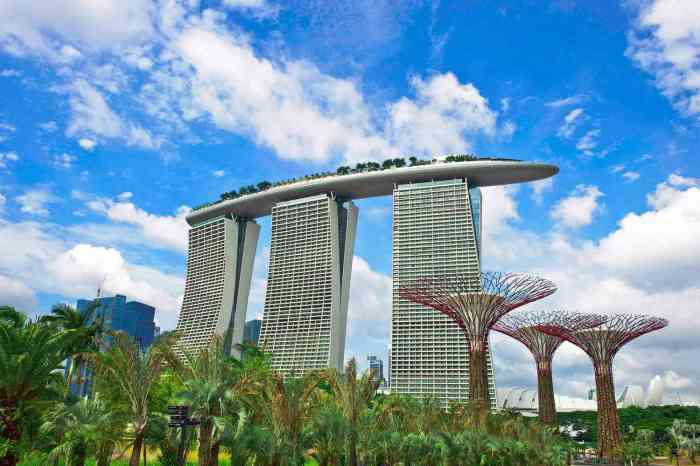
The hotel market in Singapore is a dynamic and vibrant one, catering to a diverse range of travelers from both within the region and around the world. With its strategic location at the crossroads of Asia, Singapore has emerged as a major hub for business, leisure, and tourism, driving the growth of its hotel industry.
As of 2023, Singapore boasts a total of over 300 hotels, offering a wide range of options to suit every budget and preference. These include budget-friendly options for backpackers and budget travelers, mid-range hotels for business travelers and families, and luxury hotels for discerning travelers seeking an unforgettable experience.
Types of Hotels in Singapore
The hotel landscape in Singapore is diverse, with a wide range of options to cater to the needs of different travelers. Here are some of the most common types of hotels found in Singapore:
- Budget Hotels:Budget hotels in Singapore offer basic but comfortable accommodations at affordable prices. These hotels are typically located in central areas, making them convenient for exploring the city. They often feature shared facilities such as bathrooms and kitchens, and may offer amenities such as free Wi-Fi and breakfast.
- Mid-Range Hotels:Mid-range hotels in Singapore offer a balance of comfort and affordability. These hotels typically offer private rooms with en-suite bathrooms, as well as amenities such as swimming pools, fitness centers, and restaurants. They are a good option for business travelers and families looking for a comfortable stay without breaking the bank.
If you are looking for a great place to stay in Singapore, there are many options to choose from. Whether you are looking for a luxury hotel or a budget-friendly option, you are sure to find something that suits your needs.
For more information on Singapore’s culture, history, and travel, you can read the article Hello world!. You can also find many things to do in Singapore, from visiting the many museums and attractions to shopping and dining. No matter what your interests are, you are sure to find something to enjoy in Singapore.
Whether you are looking for a relaxing getaway or an action-packed adventure, Singapore has something to offer everyone.
- Luxury Hotels:Luxury hotels in Singapore offer the ultimate in comfort and opulence. These hotels are typically located in prime locations, and offer a wide range of amenities such as fine dining restaurants, spas, and rooftop bars. They are a good option for discerning travelers looking for an unforgettable experience.
Hotel Occupancy Rates in Singapore
Hotel occupancy rates in Singapore have fluctuated in recent years, influenced by a number of factors such as economic conditions, tourism trends, and the supply of hotel rooms. In 2022, the average hotel occupancy rate in Singapore was around 80%, a significant increase from the previous year.
This increase was largely driven by the easing of travel restrictions and the return of international tourism.
Factors Influencing Hotel Demand in Singapore
Hotel demand in Singapore is influenced by a number of factors, including:
- Tourism:Singapore is a popular tourist destination, attracting millions of visitors each year. The city’s vibrant culture, world-class attractions, and excellent infrastructure make it a popular choice for both leisure and business travelers.
- Business Travel:Singapore is a major financial and business hub, attracting a large number of business travelers. The city’s strategic location, excellent transportation infrastructure, and modern business facilities make it an ideal destination for conferences, exhibitions, and other business events.
- Economic Conditions:The overall economic conditions in Singapore also have an impact on hotel demand. During periods of economic growth, hotel demand tends to increase as more people travel for business and leisure. Conversely, during periods of economic downturn, hotel demand may decrease.
Hotel Guest Demographics and Preferences

Hotel guests in Singapore represent a diverse mix of travelers from around the world. Understanding their demographics and preferences is crucial for hotels to tailor their offerings and enhance the guest experience.
Guest Profile
- Age:Singapore attracts guests of all ages, with a significant portion falling within the 25-44 age group.
- Nationality:International travelers dominate the hotel guest market, with visitors from neighboring countries like Indonesia, Malaysia, and Thailand being the most prevalent.
- Purpose of Visit:Business travel is a major driver of hotel demand in Singapore, followed by leisure and tourism.
Preferences
Guest preferences vary based on their demographics and purpose of visit. However, some common preferences include:
- Room Type:Business travelers often opt for standard rooms or suites with comfortable workspaces, while leisure travelers prefer larger rooms with amenities like balconies or scenic views.
- Amenities:In-room Wi-Fi, air conditioning, and flat-screen TVs are essential amenities for most guests. Other popular amenities include fitness centers, swimming pools, and business centers.
- Location:Guests prefer hotels located in convenient areas with easy access to transportation, shopping, and dining options. Proximity to attractions and business districts is also important.
By understanding the demographics and preferences of their guests, hotels in Singapore can effectively cater to their needs and provide a memorable and enjoyable experience.
Hotel Marketing Strategies
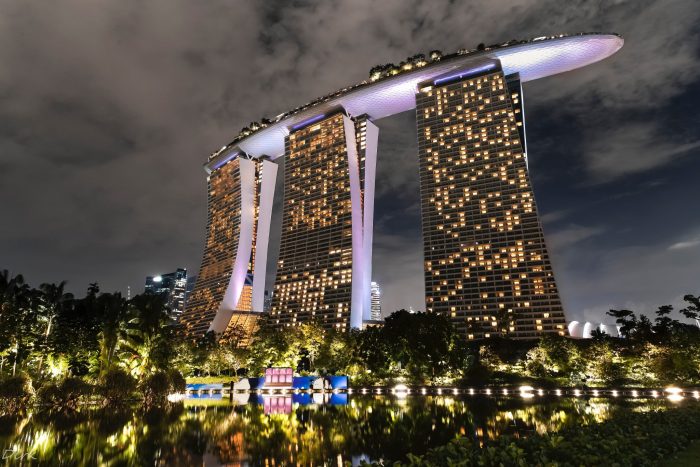
To succeed in Singapore’s competitive hotel market, it’s crucial to implement effective marketing strategies that resonate with target audiences. Hotels in Singapore employ a diverse range of marketing channels, both online and offline, to reach potential guests and drive bookings.
Online Marketing Channels
Online marketing has become increasingly important for hotels in Singapore, with a significant portion of bookings now made through online travel agents (OTAs) and hotel websites. Effective online marketing strategies include:
- Search Engine Optimization ():Optimizing hotel websites and content to rank higher in search engine results pages (SERPs) for relevant s.
- Paid Search Marketing:Running paid advertising campaigns on search engines and social media platforms to target specific audiences.
- Social Media Marketing:Engaging with potential guests on social media platforms, showcasing hotel amenities and experiences, and running targeted advertising campaigns.
- Email Marketing:Building an email list and sending targeted email campaigns to promote special offers, packages, and upcoming events.
- Online Travel Agents (OTAs):Partnering with OTAs to distribute hotel inventory and reach a wider audience.
Offline Marketing Channels
While online marketing is essential, offline marketing channels still play a significant role in reaching potential guests, particularly those who prefer traditional methods of booking. Effective offline marketing strategies include:
- Print Advertising:Placing advertisements in local newspapers, magazines, and travel guides.
- Public Relations:Generating positive media coverage through press releases, media events, and collaborations with influencers.
- Trade Shows and Exhibitions:Attending industry events to meet with potential clients, showcase hotel offerings, and build relationships.
- Direct Mail Marketing:Sending targeted direct mail campaigns to potential guests, such as postcards, brochures, and special offers.
Case Studies of Successful Hotel Marketing Campaigns in Singapore
Several hotels in Singapore have successfully implemented innovative and effective marketing campaigns to drive bookings and build brand awareness. Notable examples include:
- The Fullerton Hotel Singapore:Launched a “Staycation in a National Monument” campaign, highlighting the hotel’s historical significance and offering exclusive packages for local residents.
- Marina Bay Sands:Partnered with local influencers to showcase the hotel’s unique amenities and experiences, generating significant buzz on social media.
- Hotel Jen Tanglin Singapore:Implemented a loyalty program that rewards repeat guests with exclusive perks and discounts, fostering customer loyalty.
Developing a Targeted Hotel Marketing Strategy
To develop a successful hotel marketing strategy, it’s essential to understand target audiences and their preferences. This involves:
- Market Segmentation:Dividing the target market into smaller, more specific groups based on demographics, travel preferences, and booking behavior.
- Customer Profiling:Creating detailed profiles of ideal customers, including their demographics, interests, and travel habits.
- Tailored Marketing Messages:Developing marketing messages that resonate with each target segment, addressing their specific needs and interests.
Hotel Revenue Management: Singapore Hotel
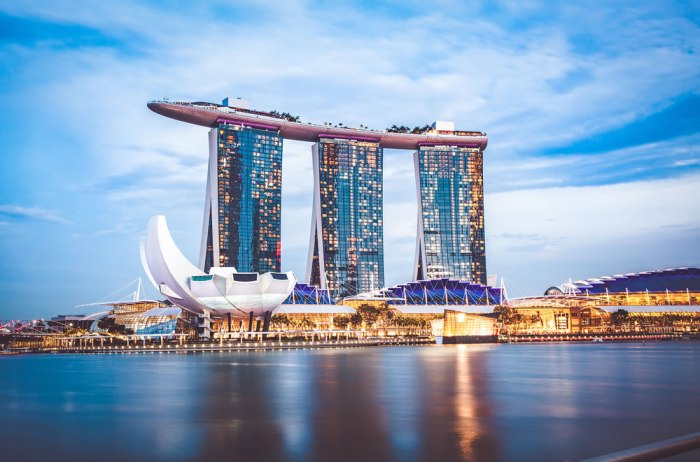
Hotel revenue management is a critical aspect of hotel operations in Singapore. It involves optimizing pricing and inventory to maximize revenue and profitability.
Key principles of hotel revenue management include:
- Forecasting demand: Predicting future demand based on historical data, market trends, and special events.
- Setting pricing: Adjusting room rates based on demand, competition, and seasonality.
- Managing inventory: Controlling the availability of rooms to maximize revenue.
li>Overbooking: Accepting more reservations than the number of available rooms to account for cancellations and no-shows.
Challenges of Hotel Revenue Management in Singapore
Hotels in Singapore face several challenges in implementing revenue management, including:
- High competition: Singapore’s tourism industry is highly competitive, with numerous hotels vying for market share.
- Volatile demand: Demand for hotel rooms in Singapore can fluctuate significantly due to factors such as economic conditions and political events.
- Limited inventory: Singapore has a limited supply of hotel rooms, which can make it difficult to optimize pricing and inventory.
Best Practices for Hotel Revenue Management in Singapore
To effectively implement revenue management in Singapore, hotels should consider the following best practices:
- Use a revenue management system: A revenue management system can help hotels automate forecasting, pricing, and inventory management.
- Monitor market trends: Hotels should closely monitor market trends, such as competitor pricing and demand patterns, to make informed decisions.
- Collaborate with other departments: Revenue management should be a collaborative effort between the revenue management team, sales team, and operations team.
- Continuously evaluate and adjust: Hotels should continuously evaluate their revenue management strategies and make adjustments as needed to optimize performance.
Hotel Operations and Management
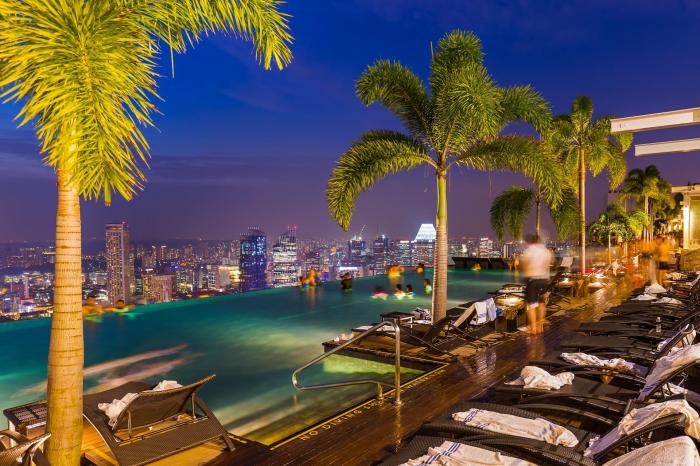
Hotel operations and management encompass the coordination of various departments to provide guests with a seamless and memorable experience. Each department plays a crucial role in ensuring efficient operations and guest satisfaction.
Departments Involved in Hotel Operations
The following departments are typically involved in hotel operations:
- Front Office:Manages guest check-in, check-out, reservations, and room assignments.
- Housekeeping:Maintains the cleanliness and order of guest rooms, public areas, and other facilities.
- Food and Beverage:Oversees dining operations, including restaurants, bars, and room service.
- Engineering:Ensures the proper functioning of all electrical, mechanical, and plumbing systems.
- Sales and Marketing:Promotes the hotel, generates revenue, and manages guest relationships.
- Human Resources:Recruits, trains, and manages hotel staff.
- Finance:Manages the hotel’s financial operations, including budgeting, accounting, and payroll.
Challenges of Hotel Operations in Singapore
Hotel operations in Singapore face several challenges:
- High Labor Costs:Singapore has one of the highest labor costs in Asia, which can impact hotel operating expenses.
- Rising Competition:The hotel industry in Singapore is highly competitive, with numerous new hotels entering the market.
- Fluctuating Occupancy Rates:Occupancy rates in Singapore can vary significantly depending on factors such as seasonality and economic conditions.
- Changing Guest Expectations:Guests today have increasingly high expectations for personalized service and amenities.
Best Practices for Hotel Operations and Management in Singapore
To succeed in the competitive Singapore hotel market, operators should consider the following best practices:
- Focus on Guest Experience:Prioritize guest satisfaction by providing personalized service, comfortable accommodations, and exceptional amenities.
- Optimize Revenue Management:Use data analysis and forecasting to maximize occupancy rates and revenue.
- Embrace Technology:Implement technology solutions to enhance guest experiences, streamline operations, and improve efficiency.
- Invest in Staff Training:Train staff to provide excellent service and handle guest requests effectively.
- Monitor Market Trends:Stay abreast of industry trends and adjust operations accordingly to meet changing guest expectations.
Hotel Technology Trends

Technology is rapidly changing the hotel industry. Hotels in Singapore are using technology to improve operations, enhance the guest experience, and increase revenue.
Some of the latest technology trends in the hotel industry include:
- Mobile check-in and check-out
- Keyless entry
- Smart thermostats and lighting
- Voice-activated assistants
- Virtual reality (VR) and augmented reality (AR)
Benefits of Using Technology in the Hotel Industry
There are many benefits to using technology in the hotel industry. These benefits include:
- Improved efficiency
- Enhanced guest experience
- Increased revenue
- Reduced costs
Challenges of Using Technology in the Hotel Industry
There are also some challenges to using technology in the hotel industry. These challenges include:
- Security concerns
- Cost
- Training
- Guest adoption
Hotel Sustainability
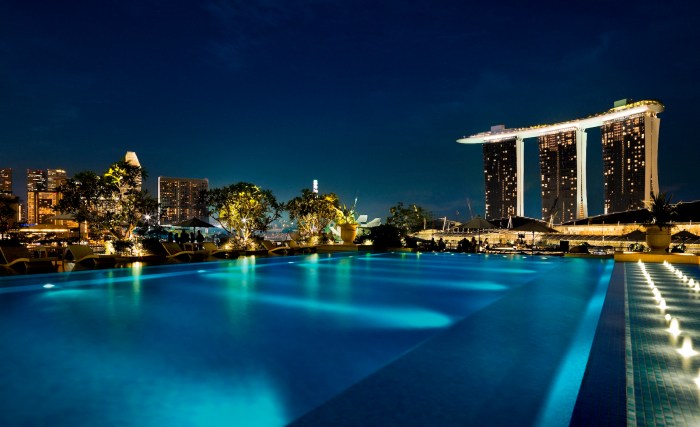
Sustainability has become increasingly important in the hotel industry, as consumers become more aware of the environmental and social impact of their travel choices. In Singapore, hotels are implementing a variety of sustainable practices to reduce their environmental footprint and appeal to eco-conscious travelers.
Sustainable Hotel Initiatives in Singapore, Singapore hotel
Some of the sustainable hotel initiatives being implemented in Singapore include:
- Using renewable energy sources, such as solar and wind power
- Installing energy-efficient appliances and lighting
- Reducing water consumption through low-flow fixtures and rainwater harvesting
- Recycling and composting waste
- Using sustainable building materials and furnishings
- Offering green amenities, such as reusable water bottles and biodegradable toiletries
- Educating guests about sustainability and encouraging them to make eco-friendly choices
Benefits of Sustainability for Hotels in Singapore
There are a number of benefits to sustainability for hotels in Singapore, including:
- Reduced operating costs through energy and water conservation
- Improved brand reputation and guest loyalty
- Increased revenue from eco-conscious travelers
- Compliance with government regulations
- Contribution to a more sustainable tourism industry
As the demand for sustainable travel continues to grow, hotels in Singapore that are committed to sustainability will be well-positioned to attract eco-conscious travelers and reap the benefits of sustainability.
Ultimate Conclusion
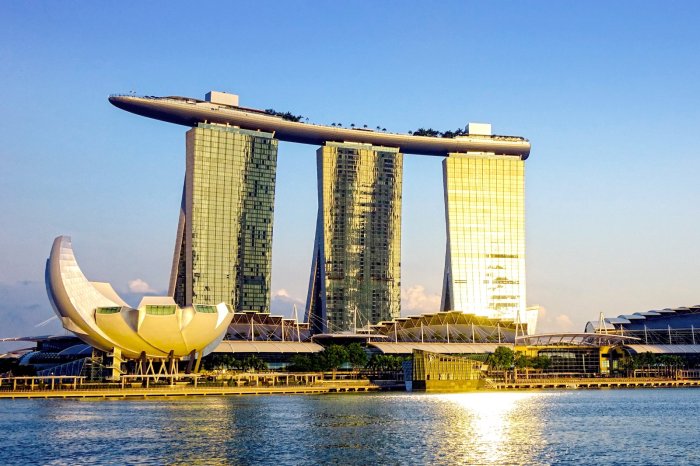
The hotel industry in Singapore is constantly evolving to meet the needs of travelers. New hotels are opening all the time, and existing hotels are renovating and upgrading their facilities. The use of technology is also changing the way that hotels operate, with many hotels now offering mobile check-in, digital concierge services, and other high-tech amenities.
Commonly Asked Questions
What is the average cost of a hotel room in Singapore?
The average cost of a hotel room in Singapore varies depending on the location, type of hotel, and time of year. However, you can expect to pay around $150 per night for a budget hotel room and $300 per night for a luxury hotel room.
What are the most popular hotel districts in Singapore?
The most popular hotel districts in Singapore are the city center, Orchard Road, and Sentosa Island. The city center is home to many of Singapore’s most iconic landmarks, including the Merlion, the Singapore Flyer, and the Marina Bay Sands. Orchard Road is a popular shopping district, and Sentosa Island is a resort island with a variety of attractions, including Universal Studios Singapore.
What are some tips for finding a good hotel deal in Singapore?
There are a few things you can do to find a good hotel deal in Singapore. First, try to book your hotel in advance, especially if you are traveling during peak season. Second, consider staying in a hotel that is located in a less popular district.
Third, look for hotels that offer discounts or promotions.